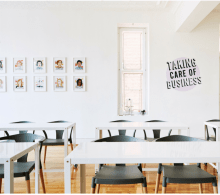This series of podcasts are provided as a resource to help translate scientific principles in I-O Psychology for workers, managers, and other I-O Psychologists. Podcasts are also available on Soundcloud: https://soundcloud.com/worksciencecenter.
Episode 11: Motivating Volunteers with Steve Rogelberg
Broadcast Date: August 23, 2019
Episode Summary: Host, Keaton Fletcher, speaks with Dr. Steve Rogelberg of the University of North Carolina – Charlotte’s Belk College of Business. Rogelberg directs outreach initiatives focusing on nonprofit organizational health and effectiveness. Here, he speaks about the Volunteer Assessment Program (VPA), a program designed to counsel nonprofits on how to deliver a better volunteer experience.
Episode 10: Job Crafting with Dorien Kooij
Broadcast Date: June 21, 2019
Episode Summary: Host, Sibley Lyndgaard, speaks with Dr. Dorien Kooij, Professor at Tilburg University School of Social and Behavioral Sciences about the benefits of job crafting and proactivity in the workforce as well as the potential benefits that these topics offer for older workers.
Episode 9: Learning Outside the Classroom: Informal Learning in the Modern Workplace
Broadcast Date: May 24, 2019
Episode Summary: Host, Corey Tatel, speaks with Dr. Chris Cerasoli about informal learning at work and its importance in the modern day work context. Dr. Cerasoli is currently a Senior Talent Analytics Consultant at UnitedHealth Group and has previously worked as a consultant at the Group for Organizational Effectiveness and as an adjunct professor at the University of Hartford and at the University of Albany.
Episode 8: Modern Motivation with Ruth Kanfer
Broadcast Date: April 26, 2019
Episode Summary: Host, Keaton Fletcher speaks with Ruth Kanfer, Professor of Industrial-Organizational Psychology at the Georgia Institute of Technology, and Director of the Work Science Center. They discuss all things motivation, what we know and where we need to go.
Episode 7: New Work Arrangements
Broadcast Date: February 15, 2019
Episode Summary: Host, Elizabeth Moraff, speaks with Dr. Gretchen Spreitzer, a professor of Business Administration at the University of Michigan’s Ross School of Business. Dr. Spreitzer has focused her work on empowering employees and on positive leadership in organizations. She will soon publish a chapter on “new worlds of work” and speaks on alternative work arrangements, focusing on how more employees will be shifting away from a traditional 9-5, 40 hours a week job in a specified location.
Episode 6: Modern Trends in IO Psychology with Richard Landers
Broadcast Date: January 25, 2019
Episode Summary: Host, Keaton Fletcher, talks with Richard Landers, John P. Campbell Distinguished Professor of Industrial-Organizational Psychology at the University of Minnesota, and the brain behind NeoAcademic, a blog covering a range of topics related to I-O psychology. They discuss the future of I-O psychology in the modern workforce and ways to integrate I-O with modern technological advances available to our field.
Episode 5: Employing People with Disabilities in the Modern Workforce
Broadcast Date: October 9, 2018
Episode Summary: Host, Keaton Fletcher talks with Devin O’Connor, Founder of the Grow Group, about ways to better incorporate individuals with disabilities in the modern workforce and how the science and practice of management can better include this underrepresented population.
To download, visit http://hdl.handle.net/1853/60466

Episode 4: Designing Coworking Spaces for Women
Broadcast Date: August 25, 2018
Episode Summary: Host, Keaton Fletcher, talks with Ali Greenberg, founder of The Broad, a coworking and community space for women and gender minorities in Richmond, Virginia. Keaton and Ali discuss the specific needs of women in the modern workforce, and what it means to design a space for women. Ali explains the thought that went into creating The Broad, and how science has informed her choices.
To download, visit: https://smartech.gatech.edu/handle/1853/60384

Episode 3: Bridging the Skills Gap
Broadcast Date: March 28, 2018
Episode Summary: Host, Ben Perrodin, talks with Tim Lawrence, Executive Director of SkillsUSA. Ben and Tim Lawrence discuss the value of and need for careers in technical education, a 21st century take on vocational education that helps guide learners into career pathways. Lawrence explains what the skills gap is and its implications for employers, employees, customers, and job seekers. He elaborates on the difference between the skills gap in basic, softer employability skills and more technical, job specific skills. He also discusses the value of industry-recognized credentials and how 21st century technology is changing the face of career technical education.
To download, visit: https://smartech.gatech.edu/handle/1853/59455

Episode 2: Space and the Work Experience: Building Better Workplaces
Broadcast Date: March 27, 2018
Episode Summary: Host, Alex LoPilato, and Dr. Sonit Bafna, an Associate Professor of Architecture at Georgia Institute of Technology, discuss architectural morphology and its reciprocity with modern work. Dr. Bafna elaborates on space syntax, the nature of how different aspects of a building come together to create a recognizable structure. Together Alex and Dr. Bafna explore the implications architecture have for work, such as establishing a hierarchy among employees, or promoting different workplace culture. Dr. Bafna also provides the titles and quick summaries of books that target the interface of psychology and architecture.
To download, visit: https://smartech.gatech.edu/handle/1853/59454

Episode 1: Big Data With Fred Oswald
Broadcast Date: March 26, 2018
Episode Summary: Host, Alex LoPilato, discusses all things big data and work science with Dr. Fred Oswald, Professor of Industrial-Organizational Psychology at Rice University. Together, Alex and Dr. Oswald clear the air about what makes big data “big,” and the difference between dustbowl empiricism and big data analytic techniques. Dr. Oswald also highlights some potential applications of big data in work science, such as data mining resumes or social media to improve hiring techniques, or monitoring multiple ambulatory measures of employees’ health and wellbeing.
For download, visit https://smartech.gatech.edu/handle/1853/59451
